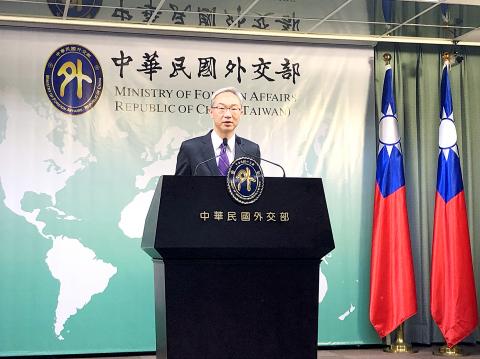The Ministry of Foreign Affairs (MOFA) yesterday said it has not received any information that US President Donald Trump has asked government officials not to visit Taiwan, and that continuing visits by senior US officials show that Taiwan-US ties remain tight.
The statement came in response to a Wall Street Journal (WSJ) report on Monday that the Trump administration is divided over the impact a US$2 billion-plus arms sale to Taiwan could have on its efforts to reinitiate trade talks with China.
The newspaper cited three anonymous White House and administration sources as saying US officials are worried that Chinese President Xi Jinping (習近平) might use the arms deal as an excuse not to meet with Trump on the sidelines of a G20 summit in Osaka, Japan, later this month.

Photo: CNA
One of the sources told the WSJ that Trump had lashed out last year after hearing that US Deputy Assistant Secretary of State Alex Wong (黃之瀚) had traveled to Taipei in March, asking officials what Wong was doing.
Trump requested that no US diplomats travel to Taiwan while he works on a deal with China, the source said.
It “took some convincing” by US officials and lawmakers to make Trump see “the value in using Taiwan as a bargaining chip in his talks with China,” the report said.
The ministry has not received information about Trump’s reported request that US diplomats not visit Taiwan, and it maintains smooth communications with the US, Department of North American Affairs Director-General Vincent Yao (姚金祥) told a routine news conference when asked about the WSJ story.
Over the past several months, many senior US officials have visited Taiwan, which demonstrates the soundness of ties, Yao said.
Among the visitors have been US Ambassador-at-Large for International Religious Freedom Sam Brownback, US Deputy Assistant Secretary of State for Trade Policy and Negotiations David Meale, US Deputy Assistant Secretary of State for International Organization Affairs Nerissa Cook and US Assistant Secretary of State for Educational and Cultural Affairs Marie Royce.
Since Trump’s administration took office in January 2017, the US has announced three arms package sales to Taiwan under the Taiwan Relations Act, showing its commitment to Taiwan’s security, to which the ministry expressed its gratitude, Yao said.
The military has sent four letters of request about purchasing M1A2 Abrams tanks and other items, and is awaiting a response, Yao said, reiterating previous comments by Ministry of National Defense officials.
The process is going smoothly and according to schedule, he said.
Additional reporting by CNA and staff writer

MAKING WAVES: China’s maritime militia could become a nontraditional threat in war, clogging up shipping lanes to prevent US or Japanese intervention, a report said About 1,900 Chinese ships flying flags of convenience and fishing vessels that participated in China’s military exercises around Taiwan last month and in January have been listed for monitoring, Coast Guard Administration (CGA) Deputy Director-General Hsieh Ching-chin (謝慶欽) said yesterday. Following amendments to the Commercial Port Act (商港法) and the Law of Ships (船舶法) last month, the CGA can designate possible berthing areas or deny ports of call for vessels suspected of loitering around areas where undersea cables can be accessed, Oceans Affairs Council Minister Kuan Bi-ling (管碧玲) said. The list of suspected ships, originally 300, had risen to about 1,900 as

Japan’s strategic alliance with the US would collapse if Tokyo were to turn away from a conflict in Taiwan, Japanese Prime Minister Sanae Takaichi said yesterday, but distanced herself from previous comments that suggested a possible military response in such an event. Takaichi expressed her latest views on a nationally broadcast TV program late on Monday, where an opposition party leader criticized her for igniting tensions with China with the earlier remarks. Ties between Japan and China have sunk to the worst level in years after Takaichi said in November that a hypothetical Chinese attack on Taiwan could bring about a Japanese

MORE RESPONSIBILITY: Draftees would be expected to fight alongside professional soldiers, likely requiring the transformation of some training brigades into combat units The armed forces are to start incorporating new conscripts into combined arms brigades this year to enhance combat readiness, the Executive Yuan’s latest policy report said. The new policy would affect Taiwanese men entering the military for their compulsory service, which was extended to one year under reforms by then-president Tsai Ing-wen (蔡英文) in 2022. The conscripts would be trained to operate machine guns, uncrewed aerial vehicles, anti-tank guided missile launchers and Stinger air defense systems, the report said, adding that the basic training would be lengthened to eight weeks. After basic training, conscripts would be sorted into infantry battalions that would take

DEEP-STRIKE CAPABILITY: The scenario simulated a PLA drill that turned into an assault on Taiwan’s critical infrastructure, with the launchers providing fire support Taiwan yesterday conducted this year’s first military exercises at Longsiang Base in Taichung, demonstrating the newly acquired High Mobility Artillery Rocket System’s (HIMARS) ability to provide fire support and deep-strike capabilities. The scenario simulated an attack on Penghu County, with HIMARS trucks immediately rolling into designated launch areas and firing barrages at the Wangan (望安) and Cimei (七美) islands, simulating the provision of fire support against invading forces. The HIMARS are supposed to “fire and leave,” which would significantly increase personnel and equipment survivability, a military official said. The drill simulated an exercise launched by the Chinese People’s Liberation Army (PLA) Eastern